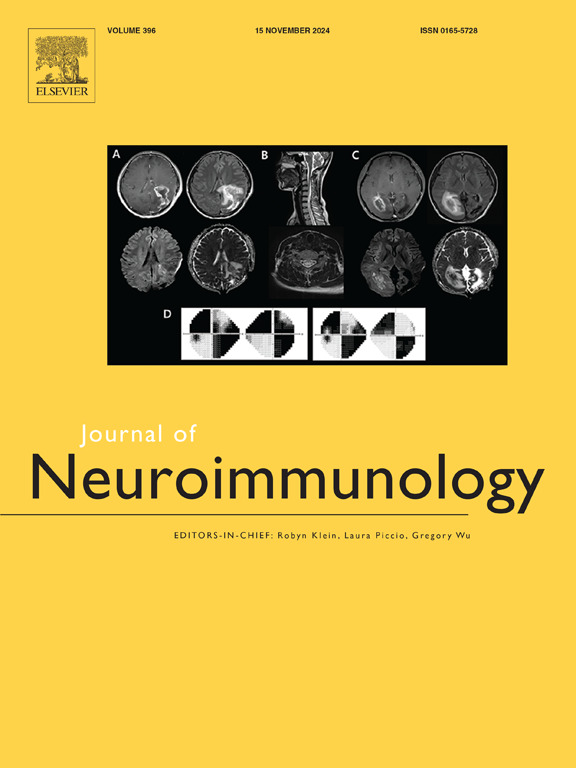Contribution of activated complements and CD59 to the pathophysiology of Rasmussen syndrome
IF 2.5
4区 医学
Q3 IMMUNOLOGY
引用次数: 0
Abstract
Rasmussen syndrome (RS) is an autoimmune-associated epilepsy with refractory seizures and deteriorating motor and cognitive functions. We expect to unveil complex immunological pathophysiology from the viewpoint of complements to establish newer immunomodulatory treatments. We examined CSF levels of activated complements (iC3b, C5a and soluble membrane attack complex (sMAC)) and CD59 (inhibitor of MAC) using ELISA kits in 36 patients with RS and 44 disease controls (DCs). Disease duration from the onset of RS to CSF examination (mean ± SD) was 80.5 ± 89.7 months (n = 73). Seizure frequency at CSF examination was daily in 56, weekly in four, monthly in six, yearly in four and seizure-free in three CSF samples. The level of iC3b was significantly higher in RS than in DCs, but that of C5a, sMAC or CD59 was not different between RS and DCs. Levels of iC3b increased along with duration of disease. The ratio of patients with the levels of CD59 more than zero increased after the acute stage. Levels of CD59 in patients with daily seizure frequency were significantly lower than those with seizure control. The odds ratio between levels of CD59 and IVIg treatment by multiple linear regression analyses was significantly high. Maximum datum of activated complements or CD59 among the course of each patient was not related with final motor, cognitive and seizure outcomes. Reduction of CD59 may be one of crucial pathologies in the early stage of RS.

活化补体和CD59在拉斯穆森综合征病理生理中的作用
拉斯穆森综合征(RS)是一种自身免疫相关癫痫,伴有难治性癫痫发作和运动和认知功能恶化。我们期望从补体的角度揭示复杂的免疫病理生理,建立新的免疫调节治疗方法。我们使用ELISA试剂盒检测了36例RS患者和44例疾病对照(DCs)患者CSF中活化补体(iC3b、C5a和可溶性膜攻击复合物(sMAC))和CD59 (MAC抑制剂)的水平。从RS发病到CSF检查的病程(平均±SD)为80.5±89.7个月(n = 73)。脑脊液检查中癫痫发作频率为每日56例,每周4例,每月6例,每年4例,无癫痫发作3例。RS中iC3b水平明显高于DCs,而C5a、sMAC、CD59水平在RS和DCs中无显著差异。iC3b水平随着病程的延长而升高。急性期后CD59水平大于0的患者比例增加。每日发作频率患者的CD59水平明显低于发作控制患者。经多元线性回归分析,CD59水平与IVIg治疗之间的比值比显著高。每个患者病程中活化补体或CD59的最大基准值与最终的运动、认知和癫痫发作结果无关。CD59的减少可能是RS早期的重要病理之一。
本文章由计算机程序翻译,如有差异,请以英文原文为准。
求助全文
约1分钟内获得全文
求助全文
来源期刊

Journal of neuroimmunology
医学-免疫学
CiteScore
6.10
自引率
3.00%
发文量
154
审稿时长
37 days
期刊介绍:
The Journal of Neuroimmunology affords a forum for the publication of works applying immunologic methodology to the furtherance of the neurological sciences. Studies on all branches of the neurosciences, particularly fundamental and applied neurobiology, neurology, neuropathology, neurochemistry, neurovirology, neuroendocrinology, neuromuscular research, neuropharmacology and psychology, which involve either immunologic methodology (e.g. immunocytochemistry) or fundamental immunology (e.g. antibody and lymphocyte assays), are considered for publication.
 求助内容:
求助内容: 应助结果提醒方式:
应助结果提醒方式:


